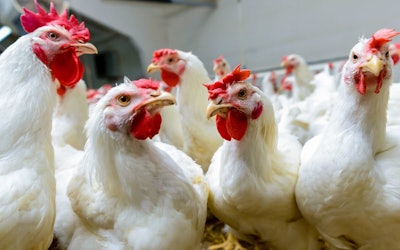
In the Philippines, the government is making progress on the procurement of a highly pathogenic avian influenza (HPAI) vaccine, according to President Ferdinand R. Marcos Jr.
He was addressing the Livestock and Aquaculture Philippines 2023 event last week, reported Philippine News Agency. Furthermore, he said, officials are finalizing protocols for the administration of the vaccine.
Over the past two weeks, the national authorities have retrospectively notified the World Organisation for Animal Health (WOAH) about further HPAI outbreaks in poultry flocks.
On the northern main island of Luzon, a further 50 outbreaks linked to the H5N1 HPAI virus were confirmed. Affecting around 162,000 birds, these began between November of last year and the end of April. They bring to 249 the total number of outbreaks in Luzon since the start of last year. Directly involved have been almost 2.08 million poultry, based on WOAH notifications.
In February of 2022, the same virus variant was detected for the first time on the southern main island, Mindanao. Since then, the Philippines’ authorities have informed WOAH about 27 outbreaks that have directly involved more than 102,000 poultry. The most recent outbreak in this area started in January at a farm with 2,251 ducks in the province of Sultan Kudarat.
Furthermore, poultry at one location on Luzon tested positive for the H5N6 HPAI virus variant back in January. The situation has subsequently been declared as “resolved.”
According to a separate notification to WOAH, just one outbreak occurred. Affected were 2,200 ducks belonging to a backyard flock in Nueva Ecija. This province is in the Central Luzon region. The source of the infection is unknown, but is thought to be migratory birds, which were seen on nearby rice fields at the time of the outbreak.
Between the two main islands of the Philippines lie several other regions. In one of these — Western Visayas — is Capiz. According to PhilStar, this province has recently been declared free of avian flu. First cases there were confirmed in December.
South Korea declares HPAI resolved in wild birds
To WOAH, the nation’s veterinary authority has recently declared the HPAI situation in wild birds “resolved.” This applies to both the H5N8 and H5N1 virus serotypes.
First cases linked to the H5N8 variant were detected in the country’s wild population in October of 2020. Just over 400 cases were reported at 248 locations across much of South Korea. In January of 2022, the outbreak was reported as ended.
In October of 2021, first cases of HPAI linked to the H5N1 virus serotype were registered with WOAH. Over the following months, 96 wild birds tested positive for the virus at 67 different places on the north, west and south of the country. This outbreak series was considered to have ended in April of this year.
A month ago, the South Korean authority declared to WOAH that the HPAI situation was “resolved” in poultry. Applying to the H5N1 virus serotype, this also came into effect in mid-April.
Following a 10-year hiatus, this serotype was detected again in the country in November of 2021. Between then and April of this year, HPAI directly impacted more than 8.85 million poultry in 122 flocks.
Of these, 75 outbreaks were confirmed during the latest outbreak “season,” which ran from October of 2022 to April of 2023. According to the agriculture ministry in the latter month, these occurred in a number of different poultry types, including 30 flocks of meat ducks, and 23 of laying hens.
Avian flu developments elsewhere in Asia
Following a six-month hiatus, the H5N1 virus serotype was detected again in Russia’s Magadan oblast in early June.
According to the WOAH notification, four seabirds found dead tested positive for this virus. Source of the infection is unknown. Magadan is part of the Far Eastern federal district.
From Japan comes confirmation of the presence of the same virus variant in one flamingo at a zoo in December of last year, and in a second red fox earlier this year.
Last month, the Japanese authorities declared to WOAH that the H5N1 HPAI situation in poultry was “resolved”.
At the end of June, Japan suspended all chicken imports from one state of Brazil. The move followed reporting of the country’s first HPAI outbreak in poultry, albeit a backyard flock.
One more avian influenza infection in Chinese child
In the Western Pacific region, one new infections with influenza A virus of avian origin in China has been confirmed to the World Health Organization (WHO).
Linked to the avian influenza A(H9N2) virus was a mild infection in a six-year-old girl in the southwestern province of Sichuan. Symptoms developed at the end of May, following the girl’s visit to a live poultry market. No members of the family showed signs of illness.
This brings to 89 the number of lab-confirmed infections with this virus in the Western Pacific region reported to WHO since December of 2015. All but two were in China. Two of the patients died, likely due to pre-existing health conditions.
A previous case — a baby boy – is reported to have fully recovered.
View our continuing coverage of the global avian influenza situation.


















